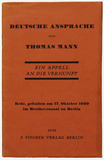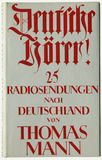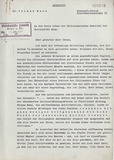Thomas Mann: Open Letter in the Neue Zürcher Zeitung from 3 February 1936
Thomas Mann: Open Letter in the Neue Zürcher Zeitung from 3 February 1936
Der deutsche Judenhaß aber, oder derjenige der deutschen Machthaber, […] ist der (im Austritt aus dem Völkerbund symbolisierte) Versuch einer Abschüttelung zivilisatorischer Bindungen, der eine furchtbare, eine unheilschwangere Entfremdung zwischen dem Lande Goethes und der übrigen Welt zu bewirken droht.
[The German hatred of the Jews, or better the hatred of the Jews by those in power in Germany, […] is the attempt (symbolised by the withdrawal from the League of Nations) to shake off civilised commitments, which threatens to bring about a terrible, an ominous alienation between the land of Goethe and the rest of the world. (ed. trans.)]
Thomas Mann, open letter in the Neue Zürcher Zeitung, 3 February 1936
During the first three years of his exile in Switzerland, Thomas Mann remained largely silent concerning political matters. His initial decision not to take an open stand against the Nazi regime was made in consideration of his Berlin publisher, the desire to retain his German audience and the hope that he could claim back his confiscated possessions. Mann only decided to make an open statement in reaction to the insistence of his family, following the move of the Fischer publishing house to Vienna in 1936, meaning his future in publishing seemed at least temporarily secure, and his successful application for Czech citizenship. A concrete opportunity to do so came about after the literary correspondent Eduard Korrodi wrote a disparaging article in the Neue Zürcher Zeitung on 26 January 1936 about German authors who had gone into exile. In his response, Thomas Mann spoke of his deep conviction, supported daily by countless human, moral and aesthetic observations, that nothing good could come of the current German leadership, either for Germany or the world.
He wrote in his diary that same day that he was aware of the consequences of his actions. He stated that he had allowed his hesitant conscience and strong conviction to finally have their say after 3 years. He knew that his words would create an impression. In December 1936, Thomas Mann, his wife Katia and the children Golo, Elisabeth and Michael were stripped of their German citizenship. Ernst von Weizsäcker, the Foreign Office ambassador in Switzerland, did not express any concerns at this.




